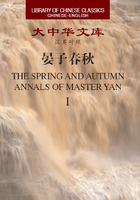
3.7 [57] 景公问欲如桓公用管仲以成霸业晏子对以不能
齐景公打算像桓公重用管仲那样重用晏子以成就王霸之业,晏子回答说不可以
【原文】
景公问晏子曰:“昔吾先君桓公,有管仲夷吾保(义)〔乂〕齐国,能遂武功而立文德,(糺)〔纠〕合兄弟,抚存(翌)〔冀〕州,吴越受令,荆楚惛忧,莫不宾服,勤于周室,天子加德。先君昭功,管子之力也。今寡人亦欲存齐国之政于夫子,夫子以佐佑寡人,彰先君之功烈,而继管子之业。”晏子对曰:“昔吾先君桓公,能任用贤,固有什伍,治遍细民,贵不凌贱,富不傲贫,功不遗罢,佞不吐愚,举事不私,听狱不阿,内妾无羡食,外臣无羡禄,鳏寡无饥色;不以饮食之辟害民之财,不以宫室之侈劳人之力;节(耴)〔取〕于民,而普施之,府无藏,仓无粟,上无骄行,下无(謟)〔谄〕德。是以管子能以齐国免于难,而以吾先君参乎天子。今君欲彰先君之功烈,而继管子之业,则无以多辟伤百姓,无以嗜欲玩好怨诸侯,臣孰敢不承善尽力,以顺君意?今君疏远贤人,而任谗谀;使民若不胜,藉敛若不得;厚(耴)〔取〕于民,而薄其施,多求于诸侯,而轻其礼;府藏朽蠹,而礼悖于诸侯,菽粟藏深,而怨积于百姓;君臣交恶,而政刑无常。臣恐国之危失,而公不得享也。又恶能彰先君之功烈而继管子之业乎!”
【今译】
3.7 [57] DUKE JING CONSULTED REGARDING HIS ASPIRATION TO BE LIKE DUKE HUAN,WHO MADE USE OF GUAN ZHONG IN ORDER TO ATTAIN THE STATUS OF OVERLORD. YANZI REPLIED THAT THE DUKE WAS UNABLE TO FULFILL THIS ROLE.
Duke Jing queried Yanzi as follow s: “In the past,our form er ruler Duke Huan had Guan Zhong,also known as Yi-wu,[1] to protect and regulate the state of Qi,and so eventually he was able to achieve military success and establish civil virtues. He allied w ith the fraternal regional princes,[2] pacifying and protecting Ji Zhou.[3] Wu and Yue obeyed his orders,and Jing-Chu[4] dreaded him. A ll obeyed him. He was sedulous in the service to the house of Zhou and the Son of Heaven granted him favor. The brilliant achievements of our former ruler resulted from the strength of Guanzi. Now I too want to entrust the government of Qi to you,Master,so that you,my Master,may help me to display our former ruler’s achievements and continue the enterprise of Guanzi.”
Yanzi replied: “In the past,our former ruler Duke Huan was able to employ the worthy and entrust responsibility to them,and so the state[5] had the ten and five household divisions.[6] The adm inistration w as all-inclusive,reaching the common people. The nobles did not hum iliate the low ly,and the rich were not haughty towards the poor. Those w ith accomplishments did not reprimand[7] the weary,and the eloquent did not scold the foolish. Official undertakings were free of personal preferences,and lawsuits were heard w ithout favoritism. Concubines w ithin the palace did not enjoy expensively abundant food,and ministers outside the palace did not enjoy over-generous,abundant emoluments. Widows and w idowers did not did not have famished faces. The people’s property was not harmed by the m isappropriation of food and drink,and the people’s strength was not exhausted w ith extravagant palaces. He was moderate in taking from the people and bestowed favors extensively. Nothing was hoarded in the warehouses,and grain was not stored in the granaries. Superiors did not exhibit arrogant conduct,and inferiors avoided sycophancy. This is why Guanzi was able to keep the state of Qi free of disasters and allowed our former ruler to take part in the Son of Heaven’s rule. Now if you,M y Lord,want to manifest the achievements of our former ruler and carry on the enterprises of Guanzi,then you should not harm the people w ith your great profligacy,and you should not provoke resentment among the regional princes w ith your desire for fine things and precious objects; and who then,among your ministers,would dare not accept your goodness and not exhaust his strength in order to follow your will? But now you,my Lord,distance yourself from the worthy,and you employ slanderers and flatterers. You over use the people so much that they cannot bear it,and you collect such high taxes that they cannot afford them. You take a great deal from the people,but bestow very little upon them. You demand much from the regional princes,but you think little of the rites due to them. The stores in your warehouse are spoiled by insects,and your attitude to the regional princes is contrary to the rites. Beans and m illet are stored and hidden away, while resentment mounts up among the people. The ruler and his ministers hate each other,and administration and punishments are inconsistent. I fear that the state w ill be endangered and fall to ruin and that you w ill not be able to take pleasure in it. How,then,are you able to manifest our former ruler’s achievements and continue the enterprise of Guanzi?”
注释
[1]I.e.,Guan Zhong. Yiwu was the courtesy name (字) of Guan Zhong.
[2]I.e.,the “princes” (诸侯). The Zuozhuan,B5. 26.3/10723,reads: 桓公是以纠合诸侯 (“For this reason Duke Huan called in the princes”).
[3]Ji Zhou—the Ji Province—located between the two parts of the Yellow River (Lüshi chunqiu,13.1/63/5),which refers to the region that covers the central plains of ancient China.
[4]Jing—荆 was the older name of the state of Chu—楚.
[5]固→国 (YZCQ-ICS,23,n. 5).
[6]For a description of this organizational structure of villages into groups of ten and five households,see Guanzi,1.4/8/7; A llyn W. Rickett,tr. Guanzi: Political,Economic,and Philosophical Essays from Early China. vol. 1,Princeton Library of Asian Translations,Princeton (1985): 103.
[7]遗→遣 (YZCQ-ICS,23,n. 7).